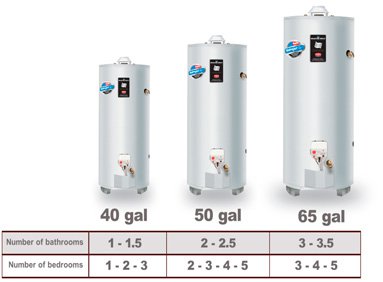Important Considerations When Buying a Water Heater (Tank)
In a previous article, we went over how your tank water heater actually functions. Most good water heater tanks will last about a decade on average, so having to replace a water heater is something you will most likely do as a homeowner at some point in your life. So what are some things to consider when buying a new tank? We will break down some key parameters below to hopefully allow you to make an educated decision the next time you replace your hot water tank.
1) The tank size – The size of the tank is important for hot water capacity. The bigger the tank you have the more hot water reserves you will have and the less likely you are to ever run out of hot water. A typical unit for smaller apartments and single family homes is 40 gallons even though you can go even smaller than that if you wanted. 50-gallon tanks are usually the next step up for mid-sized homes and 70-gallon tanks or even using two 40-gallon tanks (total of 80 gallons) is possible for larger homes (See Figure 1 below). Another factor to consider is how many people are living on the property. If you are living in a larger home, but are an empty nester you may be able to get away with only having a 40-gallon tank as your hot water use will be much less. If you need more guidance on tank sizing, this article a good read.

2) First Hour Rating – Maybe even more important than the tank size itself with regards to hot water capacity, is the first-hour rating of the unit. This rating is the amount of hot water a unit can provide in an hour's time when the tank starts off completely full of hot water. To give an example, if a unit is a 40-gallon tank, and has a 65-gallon first-hour rating, it can provide an additional 25 gallons of hot water over an hour's span. When you are selecting a new water heater it is important to factor the First Hour Rate into the equation. For instance, going back to the example of the empty nester, they may wish to buy a smaller tank with a high first-hour rating. This way when your kids come home to visit, you are able to handle the higher capacity, but when you are alone you are not paying to heat up a larger tank of water.

3) Efficiency – There are a lot of different options when it comes to types of water heaters to buy. From gas to electric, conventional to heat pumps, natural draft to induced draft. We will have to get into each of these in another article but the biggest thing I want you to focus on is the overall efficiency of the unit. While you may be tempted to find the cheapest model out there, it may cost you over time in your utility bill. On almost every hot water tank you see at the store you will see a tag with a dollar amount of estimated dollars it will cost per year to run this unit. This tag is required by the Federal Trade Commission so consumers can more easily understand which units are more efficient.
While anyone can see that a unit that costs $145 a year compared to $195 a year is more desirable, there are other things you need to check (Reference Figure 2 for further detail). When they calculate the yearly cost they assume 2 things, first that the use of the unit will be average, and second that the price for the gas or electricity you pay is average. If you use your hot water less often and your local gas or electricity prices are lower, you will naturally pay a lower amount than what is listed. However, the opposite is true higher use and higher utility price will lead to more cost per year.
Use is something that is very hard to quantify without data so unless you know you rarely use hot water as the sole occupant of a property or have a family that you can field a football team with, I would recommend assuming you are an average user. For your utility rate, it is smart to check your gas or electric bill (depending on your water heater's power source) and see what the price per Therm or Kilowatt-hour is. The Energy Guide will have listed what the assumed energy output was for their calculation and also sometimes the rate they used. So for instance, if they calculated 165 therms for a gas water heater for a year and assumed $1.10 per therm for the utility rate, they would have list $181 as the yearly cost ($1.10 x 165 = $181.50). But if you look up your utility rate and see $1.20 per therm on your bill, your yearly cost will be $198 assuming average use.
So how do we use this information when purchasing a tank. If you were just concerned with saving over the life of a unit then here is a quick calculation you can run.
[Initial Cost of Tank] + 10 x [Yearly Tank Cost] = Total investment
Make sure the yearly tank cost is from your calculation using your energy bill as the different unit will look more or less desirable based off utility rate (for example, more efficient units will look more desirable when the utility rate is higher). So lets take two tanks and compare. Tank A costs $800 upfront and will cost $175 a year to run, Tank B costs $1200 upfront and will cost $1500 a year to run. Running the calculations:
Tank A: $800 + 10 x $175 = $2550 total investment
Tank B: $1200 + 10 x $150 – $2700 total investment
So as you can see, while Tank B is clearly more efficient, Tank A will save the user $150 over the life of the tank. If cost was the only factor, Tank A would be the right choice for you.
4) Your Current Setup – Like that feeling of buying a new couch only for it to not fit up the stairs or through your doorway, it is important to make sure your new water heater fits your current set up. First and foremost, we need to make sure it will fit dimensionally speaking, so don’t upgrade from a 40 to a 5o gallon tank without measuring first. Additionally, if you want to convert from a gas-powered tank to an electric tank, you may need to hire an electrician to run a new dedicated circuit to the tank (and vice-versa with a plumber for a gas line). Unless you have a good reason, it is usually best to buy something comparable to your current setup.

5) Tank Construction Material – Believe it or not you can actually buy a completely plastic hot water tank versus the typical steel constructed versions. Plastic Tanks actually have a lifetime warranty and may never need to be replaced (or at least not for a long, long time) because they don’t corrode as metal tanks do. The catch is they are more expensive than metal tanks and while they don’t require replacement, they will require maintenance and replacement of certain components that are still made of metal. So if you recently bought your forever home and never want to have to physically replace your hot water tank again, plastic tanks may be a worthwhile investment. If you don’t know where you will be living a decade from now, might as well stick with a cheaper tank.
I hope you find this information helpful when you go and make your next hot water tank purchase.




